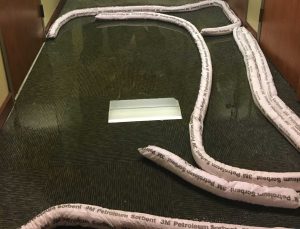On Aug. 31 three of the dorms on Commons, East, West and North flooded due to rains from Hurricane Harvey. Jadah Keith was a freshman whose dorm room was one of the most impacted in East.
“I was doing my psych homework and I was listening to music too and I just had one headphone in… and then all of a sudden I hear dripping splashing noises so I look up and I see that there’s water pouring onto my windowsill,” Keith said. “So I immediately jump up I tell my roommates it’s flooding…So we started moving my bed because it got on my bed too. I looked and it was on both of my pillows. The stain on my bed is like so massive and the color of the water was dark yellow, like gold. And when we touched it we felt it fizzle a little bit.”
The Vanderbilt Office of Housing and Residential Education has several methods to deal with flooding, but it is difficult to prevent preemptively. According to Jim Kramka, the Senior Director of Housing Operations, the first step is maintaining the building itself. This is accomplished through yearly checks performed by a division of the of the university known as plant operations.
“Preparing for hurricanes and floods is hard,” Kramka said. “But the first step, of course, is keeping the building in good repair. Every year the university checks all of the physical plant. Housing has responsibility for the residence halls and the way that we do that is that we partner with plant operations. So if the window in your room gets broken we at housing will report it and we’ll monitor it, but plant operations will come and fix it.”
The yearly checks include checking the gutters and the drainage systems, but sometimes this is not enough. The rooms in East that experienced the worst flooding were rooms that had never had a problem before. According to Kramka, East flooded due to a gutter that was not draining properly.

“Unfortunately, this is the time of year when trees begin to drop their leaves and they can fill these. In addition to the twenty-seven residence halls we have we have the rest of the campus too, so right before a storm there is no way they’re going to be able to go around and check all these things,” Kramka said. “So there are times when you just have some issues like that. East, that was a one off sort of thing, the room that had most of the water is not a room that we have ever had a problem with before.”
Although East may have been an exception, some dorms are known to be prone to flooding. Dorms like North and West, for example, were built with parts of their buildings below ground level, putting them at a higher risk for flooding during sustained heavy rains.
“If water comes down fast enough it’ll go into the stairwell and even though there is a drain the drain sometimes can’t keep up with the rain. And that’s what happened there and at West during that rain,” Kramka said.
Part of the problem, according to Kramka, is that it is difficult to anticipate where leaks will pop up. If the Housing Office knows about a leak in advance, they can send plant operations out to fix it. Often, however, these leaks are not apparent until after the water is already coming into the building.
The older residence halls are more prone to flooding, partly because they were built before architects were required to pay attention to how their structures affected runoff. Modern building codes force designers to be more careful about the ways they are redirecting water. One method used to redirect the prevent all of the runoff from flowing into the city’s storm system is retention ponds. These are depressions filled with rocks and grasses that allow water to slowly seep into the ground.
For those whose property has been damaged due to leaks or flooding, there are many steps they have to take. If they had personal items, such as clothes and shoes, that were damaged then they will do what is referred to as a “bag and tag.” The students will work with an RA to put all of their belongings into bags labelled with their information; the university will then pay to have those items dry cleaned. For items damaged beyond repair, the university will pay to replace them.
The Housing Office also keeps several vacancies throughout the school year for incidents like these. When East, West and North flooded, somewhere between ten and twelve students were relocated.
“We really leave the decision almost exclusively up to the students,” Kramka said. “To say you can stay here if you want, and some will if there’s not much water. Some will just walk down the hall to a friend and they just couch surf essentially among friends. Others will come to us and say I don’t have any place to go and so we’ll find them a place to go at that point.”
If we don’t know about it we can’t fix it and water does a lot of damage
Once the students and their property has been taken care of, the housing office will call in plant operations to dry out the dorms. They use an industrial wet vac to vacuum out the water and dehumidifiers to help get rid of excess moisture. The university has also been replacing the carpet in dorm rooms with hardwood flooring, which is easier to clean.
Kramka suggests that during heavy rain, the best way to protect your stuff is to pay attention. If you see something, report it. The housing office cannot respond to problems if they don’t know about them.
“Really watch for water,” Kramka said. “I mean, you do want to keep windows closed. And if you see water coming into the building, whether it’s in your own room, you want to let somebody know right away. I think it’s really important to say that and for students to understand that. Because sometimes they think nobody is going to do anything about it or they don’t want to be a pest. If we don’t know about it we can’t fix it and water does a lot of damage.”


